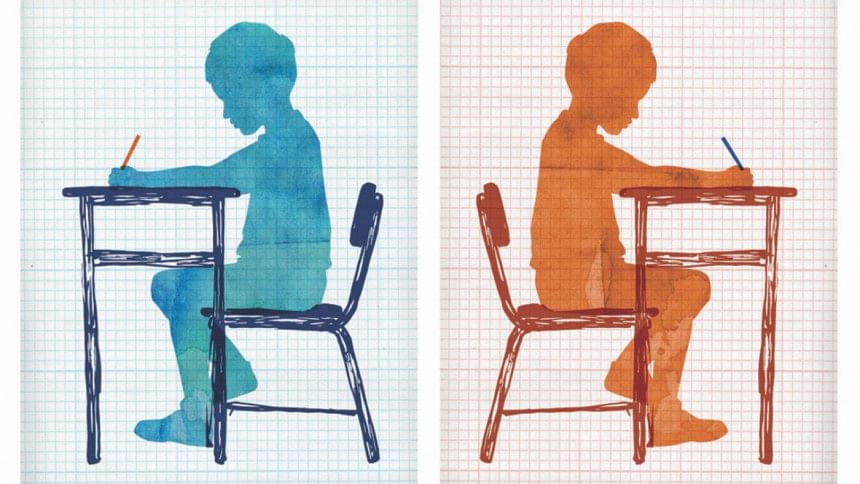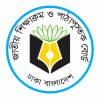The futility of the debate

It is not surprising that the debate about the quality of education in Bangladesh pops up frequently. What is surprising is that the debate almost never focuses on the underlying problems hounding education. Instead, it becomes about setting up a contrast between two alternatives. This tendency to demonise students and create a line that separates students of Bangla medium from those of English medium schools does nothing to solve the problems plaguing the education systems in Bangladesh. Instead, it only serves to create resentments, with each side feeling the need to disparage the other.
Take the example of the recent social media eruption about the lack of knowledge of SSC students who were awarded a GPA 5. On May 30, a video clip that featured students failing to answer questions related to general knowledge -- for instance, dates of national importance or who Pythagoras was -- went viral on social media. The perceived ignorance of Bangla medium students was being highlighted, while people laughed at the expense of the kids who did not have a hand in how the grades are distributed.
It is somehow taken for granted, by students and parents alike, that there is a fundamental difference between students of Bangla medium and English medium schools. This division carries on to higher education as well. During the protests against VAT on private university tuition fees, I saw many otherwise progressive people blaming students for inciting trouble. Students studying in private universities should pay more since they are 'rich', and spend all day doing anything but studying, or so the generalisation went. Of course, most of the people making such comments had studied in public universities.
Somehow, the universally recognised right to education had become dependent on other variables during the debate. And this is the problem — the moment the debate shifts to who is better for having studied in a particular school or university, the focus shifts from what's important, such as the educational system, the lack of good teachers, quality of the curriculum and text books, the disparity of the number of students and good educational institutions or the commoditisation of education. Focussing on other socio-economic issues — such as the fact that education for many in this country is a path to getting a stable, well paying job, or that there is pressure from parents for students to get good grades, irrespective of what they learn — cannot even be imagined when parents and students are more worried about the status conferred on them from studying in a particular institution.
This 'othering' of people who do not have the same education background is not limited to English vs. Bangla medium or public vs. private universities either. Students of English version of the national curriculum get defensive sometimes if they are labelled as 'Bangla medium', and are quick to point out that they study the national curriculum but in English. These generalised portrayals of English or Bangla medium students are usually based on a handful of personal experiences: Bangla medium students will point toward friends or acquaintances from English medium schools who do not know Bangla and vice-versa.
Yes, there are problems, huge ones, with the education system of Bangladesh. Rote memorisation is the norm, and the questions do not encourage analytical thinking. And the number of English medium students I know, who not only cannot speak or read Bangla well but are also proud of this flaw, is also high. However, this does not mean that all English medium students, or even the majority, are oblivious to national history or literature, or pass their time "partying" as some put it, neither is it the case that Bangla medium students are not fluent in English or cannot be proficient in analytical subjects such as Math or Physics. We have had national math Olympiad champions from Bangla medium schools and many students from English medium backgrounds pursue educational and research work related to Bangladesh.
Yet this perception of a difference lingers. Each mock the other; Bangla medium students are khyat (uncool) and English medium kids are noshto (spoilt, delinquent).
The debate needs to shift from glorifying one's own education system by constantly setting up generalised stereotypes of the other in terms of their proficiency in a certain language, their lifestyle, values, dress code and supposed correlation to the education background. The public shaming of the students, who failed to answer a reporter's questions, was the very worst of the reactions on social media. Initially, no one was talking about the education system, the measly allotted budget for the education, or the social and political pressures which lead teachers and the education boards to 'just hand out GPA 5s' as many term it.
However, it was heartening to see debates soon after condemning this, and start talking about who was really to blame for their failure to answer. Excellent responses have been written about the state of the education system. As Azmin Azran wrote in his article on Shout (The Daily Star) that same day, "There is a problem here that needs to be looked at: there are too many people out there with GPA 5 they probably don't deserve, but it's not as if the students are stealing them, it's being given away and that's what needed to be investigated."
We need to come to terms with that fact that the number of schools and universities, not to mention the quality, is disproportionate in a country with such a big student population. We need to understand that education is still seen by many as a luxury, or at best a qualification for jobs in a country which has seen economic hardships for the longest time. The idea of education for learning is not the norm. Some might say that instances such as the video that went viral actually highlight the state of our education system. From what I have seen, it only serves to strengthen a certain jingoism of educational backgrounds. This supposed difference in lifestyle, values and qualifications are and have been taking the debate away from much more relevant issues. Otherwise, the whole debate is as fruitful as banning coaching centres. Sure, coaching centres are bad, but they aren't going to go away till someone realises that school teachers are paid a measly amount at the end of the month and therefore, will find ways to supplement their income.
The writer is Junior Editorial Assistant, The Daily Star.

 For all latest news, follow The Daily Star's Google News channel.
For all latest news, follow The Daily Star's Google News channel. 








Comments